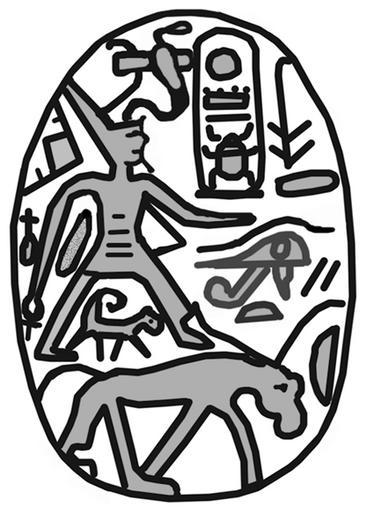MAKE A MEME
View Large Image

| View Original: | Egyptian_-_Scarab_with_the_Cartouche_of_Thutmosis_III_(1479-1425_BC)_-_Walters_4220_-_Bottom.jpg (643x900) | |||
| Download: | Original | Medium | Small | Thumb |
| Courtesy of: | commons.wikimedia.org | More Like This | ||
| Keywords: Egyptian - Scarab with the Cartouche of Thutmosis III (1479-1425 BC) - Walters 4220 - Bottom.jpg This steatite scarab is inscribed with the throne name of Thutmosis III 1479-1425 BC in sunk relief technique on the flat underside The top of the scarab is high and has a simple carved design The workmanship is slightly rough and some of the details are out of shape The piece functioned as an individualized amulet and was originally mounted or threaded The amulet should ensure royal protection and support its owner and make him as successful in warding against dangers as the king The scarab was produced after the death of Thutmosis III who was most probably understood as a protective god and successful model of divine kingship The combination of different royal manifestations with protective renewal and good luck elements intends to assure the all-inclusive magic power of the amulet The body and posture of the animal figure in the lower round of the scarab is similar to a donkey but the long horns which are too long to be ears make it more likely that it represents the royal bull Images of bulls on scarabs are mostly part of a motif showing the animal trampling on an enemy between 1292 1069 BC New Kingdom light beige steatite with blue-green glaze cm 1 2 1 9 2 7 accession number 42 20 26540 Henry Walters Baltimore 1911 mode of acquisition unknown Walters Art Museum Henry Walters Acquired by Henry Walters 1911 Translation Throne name of King Thutmose III in a cartouche combined with state ruler title King of the Two Lands Men-kheper-Re place of origin Egypt Walters Art Museum license 2D Ancient Egyptian scarabs in the Walters Art Museum Hieroglyphs on scarabs Cartouches of Thutmosis III Scarabs of Thutmosis III Panther hieroglyph | ||||